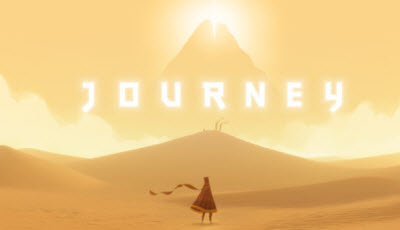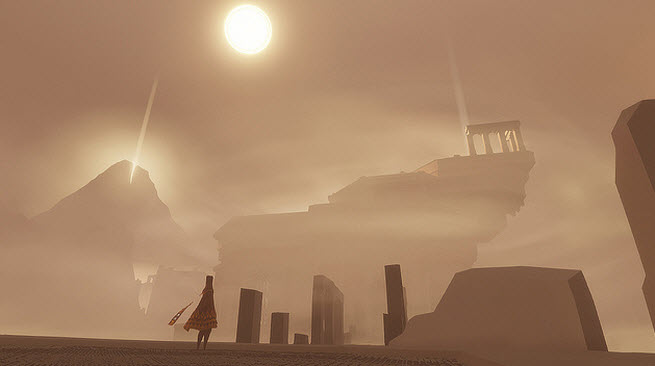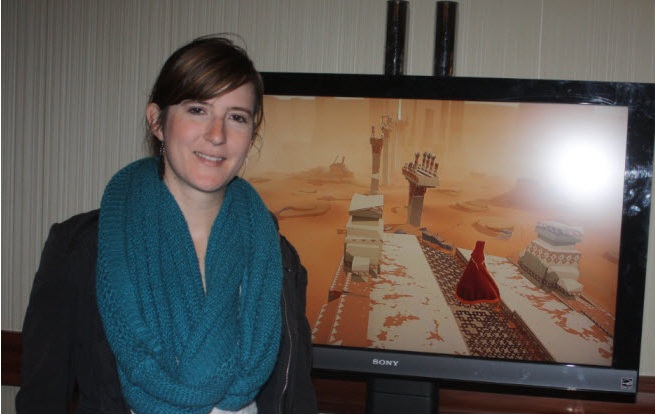 Kellee Santiago is co-founder and president of Thatgamecompany, the Santa Monica, Calif.-based game studio she started with Jenova Chen. After three years of work, the company’s Journey game on the PlayStation 3 will go on sale as a downloadable title on the PlayStation Network on March 13. The game has already gotten accolades from game critics, including a high rating of 90/100 from GamesBeat. In the game, the player goes on a solitary journey across the desert to a distant mountain. The visual effects of the wind and sand are beautiful, and the story is told without any words.
Kellee Santiago is co-founder and president of Thatgamecompany, the Santa Monica, Calif.-based game studio she started with Jenova Chen. After three years of work, the company’s Journey game on the PlayStation 3 will go on sale as a downloadable title on the PlayStation Network on March 13. The game has already gotten accolades from game critics, including a high rating of 90/100 from GamesBeat. In the game, the player goes on a solitary journey across the desert to a distant mountain. The visual effects of the wind and sand are beautiful, and the story is told without any words.
Thatgamecompany’s work has drawn attention because it has avoided violence in games and is steering into emotionally engaging content that very few others in the industry are doing. In doing so, it has become one of the models for innovation among independent game studios.
 Santiago gave a TEDx talk in 2010 on how video games can be considered art and was challenged on that assertion by critic Roger Ebert, who said that video games can “never be art.” But judging by the outstanding reviews that Journey is getting, Ebert may have to eat those words.
Santiago gave a TEDx talk in 2010 on how video games can be considered art and was challenged on that assertion by critic Roger Ebert, who said that video games can “never be art.” But judging by the outstanding reviews that Journey is getting, Ebert may have to eat those words.
We caught up with Santiago at the Game Developers Conference this week. Here is a transcript of our talk.
GamesBeat: How is your GDC this year?
Kellee Santiago: I helped organize the Indie Games Summit this year, it’s been really great so far. I’ve been happy about that.
Gamesbeat: That seems like a lot of work, a lot of games coming in.
KS: Yeah. I was at TED Active last week too. When the first session started yesterday I thought, “I’m at another conference.” [laughs] “Oh, God.”
GB: I played the game all the way through, and the second time through with my 15-year-old daughter. She remembered Flower.
KS: Oh, wow! Cool.
GB: And my joke was, you know, you guys take too long to make these things. [laughter] Three years to make this one?
KS: Yeah, it’s definitely our biggest endeavor to date. We got up to about 13 people, compared to Flower, which was about seven people over two years.

GB: And it was about three hours, is that the gameplay…?
KS: It kind of depends on what sort of player you are, but I think if you go pretty much straight through the experience, it’s two to three hours.
GB: Is that shorter than Flower? I think I remembered Flower being a little longer.
KS: No, that’s what’s interesting. It depends. I know just anecdotally, people who have e-mailed us and such have said their flower experience was around three to five hours. Whereas I can play through it in 45 minutes. Journey takes me usually about 90 minutes, being the super pro player because I know how to go through it.
GB: So what are you guys thinking of with some of the design, when you target a short amount of time that way? Compared to shooting for a five or ten-hour experience…
KS: Well, there’s a couple of things that factor into the length of play. One is, we do want players to have the ability to go through the entire emotional arc in one sitting, so you can really absorb that whole experience in one sitting if you want to. But also, our goal is really to…
GB: Is that like a trip to the movies?
KS: Kind of. Certainly we borrow a lot from Holllywood film structure. Jenova has spoken in the past about the three-act structure that he tries to implement, and the overall emotional arc as well, of Flower and Journey. But also, we’re really searching for an experience that feels right. It’s such an intangible thing, but the flow of it feels appropriate, the contrast and comparison of the emotions from level to level have a good beat. In that way, it’s sort of evaluating it at the level I would compare to an editor, a book editor or a movie editor, where there’s certainly some ideas in mind about possibly the length of the experience, but really what you’re looking for is almost an intuitive, gut feeling to it. That the beats and the movement from beat to beat make sense. That’s our primary motivating factor. As opposed to just a somewhat arbitrary number like five hours, six hours. For me personally, the first Portal game is a great example of that, where it was maybe a two to three-hour experience, but there was nothing additional. In general, it doesn’t feel like there was anything missing, and there was no excess.

